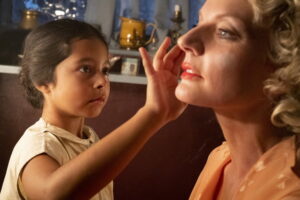The heart-breaking footage taken on the outskirts of a Kabul airport showing a baby passed to US troops on a perimeter wall depicts just how desperate Afghan parents are to find a safe haven for their children. Sadly, this is not new – parents throughout the ages have had to make tough decisions to ensure safety for their children. It reminded me of Meryl Streep’s film Sophie’s Choice where upon arrival at Auschwitz, her character was forced to choose which one of her two children would be gassed and which would proceed to the labour camp.
At The Separated Child Foundation, we are reminded daily of the sacrifice parents and children make when they decide to endure the perilous journey to escape war and find refuge in another country.
David Bartlett’s highly acclaimed film Mousie, made in support of our charity, tells the story of a mother forced to abandon her daughter in the hope that it would save her life. Seven-year-old Roma Helene is handed to tap dancer Katherina who works in a cabaret club in Berlin with the intention that she will arrange to send her daughter to safety in America.
It is 1936 and in readiness for the Berlin Olympics, the city’s streets are being ‘cleansed’ of Jews and Roma gypsies.

“This is not just a film about Nazi Germany but also about the Western World today. A lot of people who voted for Hitler in the Thirties didn’t realize how it was going to end up and when I look at what is happening now in previously-progressive countries, it bothers me a lot. Refugees are being demonised with a total disregard for the sovereignty of truth. People telling lies have always been around but before they were peripheral – on the side-lines. We need to be very aware how this discourse can start casually and then spiral out of control.”
Bartlett is a keen amateur historian and a story teller and he says that sometimes it is necessary for artists to step in and do something.
“I wanted to make a film not about war but about the descent of nations towards war. And I wanted to focus it on a child. Because when I look at the plight of refugees and particularly the children, it really irks me that they are the ones who end up arguably paying the price even though they had nothing to do with creating the scenario. They are just the innocent victims.”
And why Mousie? “Well, I felt that the Romani story has been largely untold,” he says. Romani travellers were the second-largest group of people killed on racial grounds in the Holocaust. They were considered outsiders and “racially impure” by the Nazis. It is difficult to quote numbers but some reports say that up to 1.5 million died.
At the time of writing, Mousie had just won its ninth Festival Award (Best Short Film at the Calabria Movie International Film Festival in Italy) and has been selected to screen at the Hollywood Grauman’s Chinese Theatre on September 5 as part of the prestigious ‘Dances with Films’ Festival. It was made on a budget of just £15,000 because everybody involved gave their time for free. If this had been a network film, the £15,000 would have been spent in the first few hours.

Independent film critic Richard Propes writes of Mousie:
“It would be nearly impossible to escape the timeliness and relevance of writer/director David Bartlett’s impossibly beautiful and thought-provoking short film Mousie. It calls us to scrutinize the world in which we live while just as fervently reminding us to celebrate those who care, those who fight for change, and the creative spirits who continue to foster hope in a world that can so easily feel exhausting and hopeless.”
Mousie was made to help raise awareness of The Separated Child Foundation.
Bartlett comments, “Short films never make money but I wanted to do something worthwhile and it was after I met with Lord Dubs who is a Patron of The Separated Child Foundation that we decided to dedicate it to the charity. It must be terrifying for the youngsters who come to Britain, alone in a foreign country and without their families. We felt that the charity matched our ideals.”
“Mousie is about hope. The little girl had hope and, in the end, she made a fool of the Nazi soldier hiding behind his important looking uniform as she tap-danced her way to freedom.”
I know only too well from talking to refugees that hope is what they cling to. Because without it there is nothing. Even those who live in awful conditions in refugee camps hope that one day they will be free to live a better life somewhere. A young woman I spoke to recently said;
“I spent two years in a refugee camp before coming to the UK – It is all we ever talked about – getting out, living in a place where we had food and clothing and a bed and somewhere to wash. It is hope that kept us going.”
Roma Felstein
September 2021

